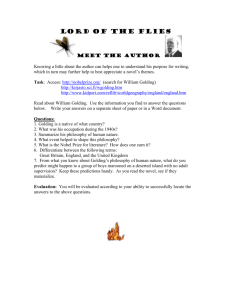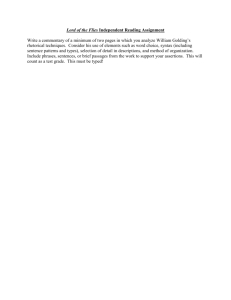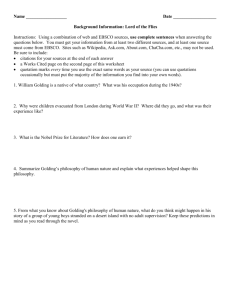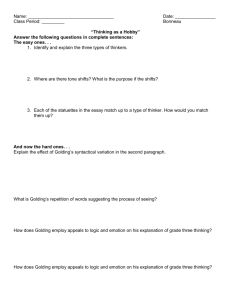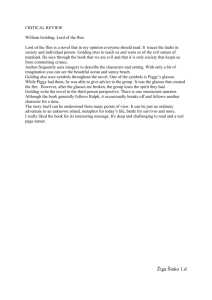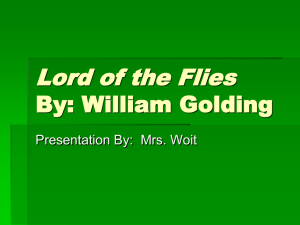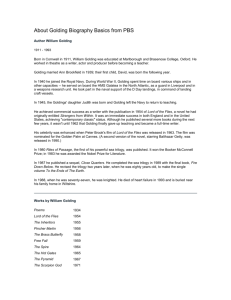File
advertisement
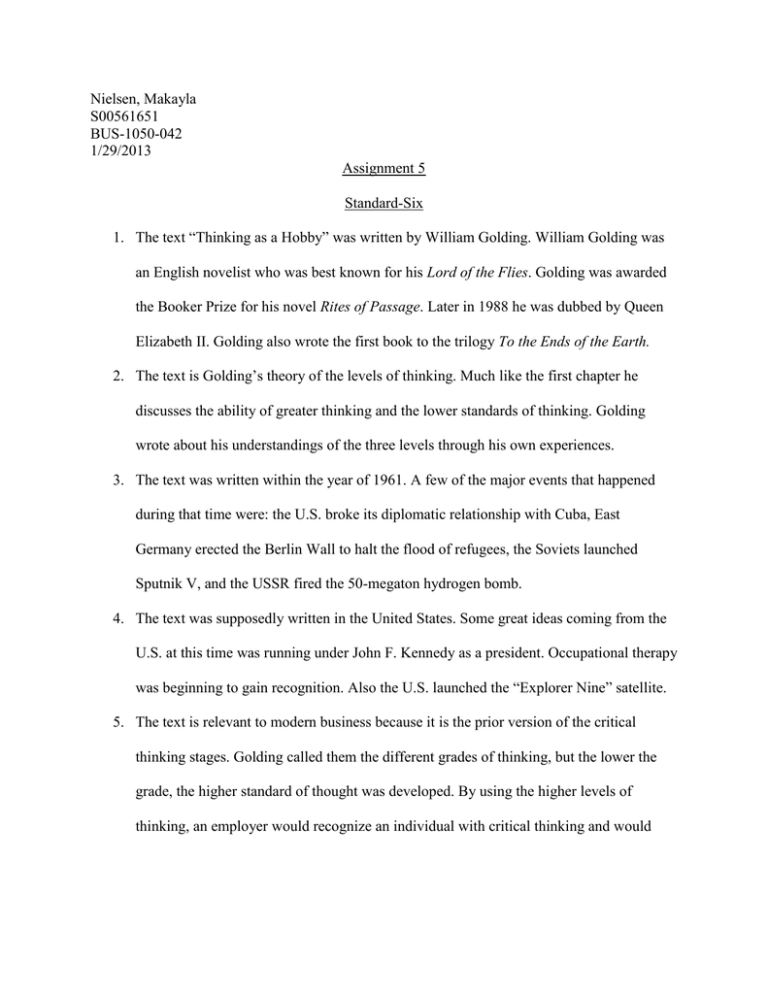
Nielsen, Makayla S00561651 BUS-1050-042 1/29/2013 Assignment 5 Standard-Six 1. The text “Thinking as a Hobby” was written by William Golding. William Golding was an English novelist who was best known for his Lord of the Flies. Golding was awarded the Booker Prize for his novel Rites of Passage. Later in 1988 he was dubbed by Queen Elizabeth II. Golding also wrote the first book to the trilogy To the Ends of the Earth. 2. The text is Golding’s theory of the levels of thinking. Much like the first chapter he discusses the ability of greater thinking and the lower standards of thinking. Golding wrote about his understandings of the three levels through his own experiences. 3. The text was written within the year of 1961. A few of the major events that happened during that time were: the U.S. broke its diplomatic relationship with Cuba, East Germany erected the Berlin Wall to halt the flood of refugees, the Soviets launched Sputnik V, and the USSR fired the 50-megaton hydrogen bomb. 4. The text was supposedly written in the United States. Some great ideas coming from the U.S. at this time was running under John F. Kennedy as a president. Occupational therapy was beginning to gain recognition. Also the U.S. launched the “Explorer Nine” satellite. 5. The text is relevant to modern business because it is the prior version of the critical thinking stages. Golding called them the different grades of thinking, but the lower the grade, the higher standard of thought was developed. By using the higher levels of thinking, an employer would recognize an individual with critical thinking and would highly consider hiring them. Critical thinkers provide a substantial amount of benefits towards businesses and are greatly desired. 6. I feel that my own level of education is developed enough to understand what is being said in this text. With full compensation on the grasp of critical thinking it was easy to compare Golding’s grades of thinking to Engh’s mentioning of rhetoric, dialect, and reason. This chapter is greatly appreciated to further deepen the great meaning of critical thinking. Questions 1-7 1. Explain “thought is often full of unconscious prejudice, ignorance, and hypocrisy.” (pg. 34 line 5) a. The phrase “thought is often full of unconscious prejudice, ignorance, and hypocrisy” can be explained as the understanding to that first unconscious thought of a subject. One could say it is the thought of a gentleman walking into a room and judging him by what he wears, how he moves, how he talks and giving disregard to who he may actually be. Unconsciously the human race gives prejudice, ignorance, and hypocrisy to anything that appears less than it. 2. Define and give an example of Grade 3 thinking. a. Grade 3 thinking is the feeling rather than the thought. An example of this would be the intent of a politician. Wanting to do whatever will benefit them the most rather than the people whom they represent. 3. Define and give an example of Grade 2 thinking. a. Grade 2 thinking is when the thinker can detect contradictions by destroying without having the power to create. An example would be the game of fox hunting. The hunters claim that the fox enjoys being hunted down and ripped to shreds, when rather it is for their own enjoyment. 4. Define and give an example of Grade 1 thinking. a. Grade 1 thinking is when the thinker asks the question and then sets out to find the answer. A great example of this would be Pontius Pilate asking the question “What is truth?” but giving no answer to that whomever may ask the question must find the answer themselves. 5. Put them in order worst first, best last. a. Grade 3 is the worst. It is only feeling rather than true thought. b. Grade 2 is the second, for it causes the thinker to develop the ability to detect contradictions. c. Grade 1 is the best because it makes the thinker propose a question in order to set out to find the answer. 6. Explain the need for Grade one thinking in business. a. The need for Grade one thinking in business is great. The ability to propose a question such as “ How can the business increase profits,” or “ How can the business be bettered” enforces the employees to seek out the answer for the greatest benefit of the business. 7. Compare Golding’s three Grades of thinking compared to rhetoric, dialectic, and reason mentioned in chapter one. a. Golding’s grade one of thinking most resonates to rhetoric. Seeing as how both are based off of emotions rhetoric is simply the more developed version of grade one thinking. Grade two is easily compared to dialectic because both have the power to destroy but not the power to create. As well both have the distinguished ability to detect contradictions. Again dialectic is more developed than grade two. As for grade three, it is quite similar to reason. Both seek out for the truth and both are considered the most highly exquisite form of thought. It is intriguing how these forms of thought have been passed down throughout the history of time, especially when one has not given much thought to them. 10 Vocabulary 1. Amiability a. The quality of sweetness of disposition. 2. Sordidness a. The quality or state of being unclean. 3. Libertine a. A defamatory name for a free thinker; free from restraint or uncontrolled. 4. Skittle a. The game of a disk or flattish ball of wood being thrown at pins. 5. Gregarious a. Habitually living in moving in a group such as a flock or herd. 6. Impediments a. That which impedes or hinders progress, motion, activity, or effect. 7. Clairvoyance a. A power attributed to some persons while in a mesmeric state, of discerning objects not perceptible by the senses in their normal condition. 8. Depravity a. The state of being depraved or corrupted. 9. Penal a. Of or pertaining to punishment, penalties or to crimes and offenses. 10. Heady a. Hurried on by will or passion; ungovernable. Works Cited "Webster Dictionary." Webster Dictionary. N.p., n.d. Web. 25 Jan. 2013. "Timeline 1961." Timeline 1961. N.p., n.d. Web. 30 Jan. 2013 "William (Gerald) Golding Biography." BookRags. BookRags, n.d. Web. 30 Jan. 2013 "1960 – 1969 World History." Infoplease. Infoplease, n.d. Web. 30 Jan. 2013. Golding, William. "Thinking as A Hobby." Critical Thinking, Readings from the Literature of Business and Society. By Edward G. Engh. N.p.: n.p., n.d. 31-38. Print.
